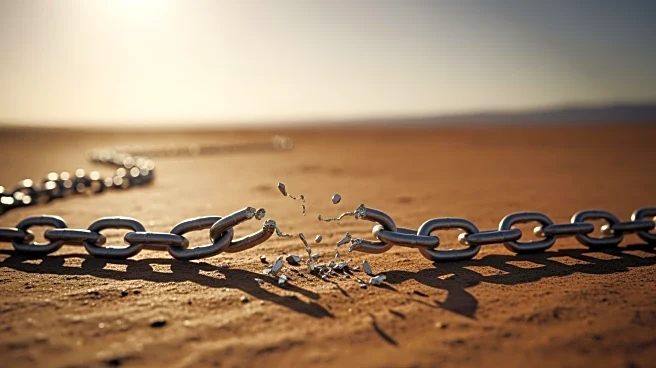What's Happening?
The International Criminal Court (ICC) has initiated investigations into potential violations of international humanitarian law in the Darfur region. This follows reports from the United Nations indicating credible instances of summary executions of civilians
by the Rapid Support Forces (RSF) as they attempted to flee the conflict. The ICC's Office of the Prosecutor expressed deep concern over reports of mass killings, rapes, and other crimes allegedly committed during RSF attacks. These actions are part of a broader pattern of violence affecting the entire Darfur region since April 2023. If substantiated, these acts may constitute war crimes and crimes against humanity under the Rome Statute.
Why It's Important?
The ICC's investigation is significant as it highlights the ongoing humanitarian crisis in Darfur, which has seen extensive violence and human rights abuses. The potential classification of these acts as war crimes and crimes against humanity underscores the severity of the situation and the need for international accountability. The investigation could lead to increased international pressure on the RSF and other involved parties to cease hostilities and allow humanitarian aid. It also serves as a reminder of the international community's role in addressing and preventing such atrocities, potentially influencing global diplomatic and humanitarian efforts.
What's Next?
The ICC's investigation may prompt further international scrutiny and calls for action from global leaders and organizations. There could be increased diplomatic efforts to broker peace and provide humanitarian assistance to affected regions. The investigation might also lead to legal proceedings against those responsible for the alleged crimes, potentially resulting in sanctions or other punitive measures. The international community may push for a ceasefire and the establishment of humanitarian corridors to aid civilians trapped in conflict zones.
Beyond the Headlines
The situation in Darfur raises ethical and legal questions about the responsibility of the international community to intervene in cases of mass atrocities. It also highlights the challenges of enforcing international law in regions with ongoing conflict and the complexities of holding perpetrators accountable. The exploitation of natural resources to fund the conflict further complicates efforts to achieve peace, as economic interests may hinder diplomatic resolutions.
















